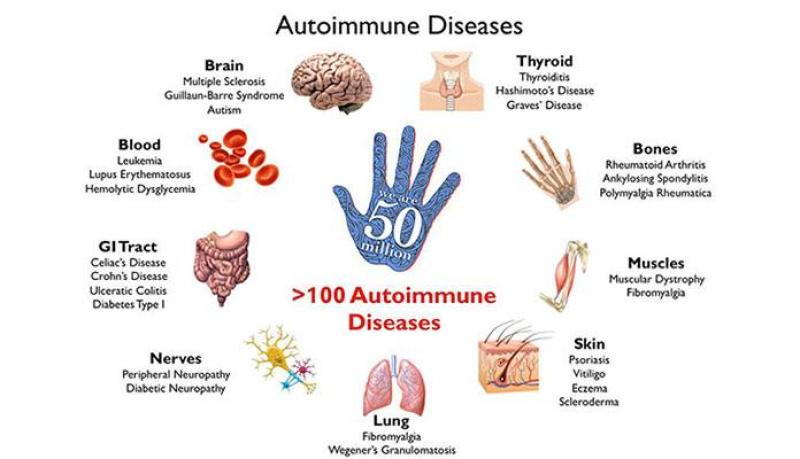How can doctors test for autoimmune disease?
Diagnosing autoimmune diseases can be complex as there are many different types, and symptoms often overlap with other conditions. Doctors use a combination of methods, including:
Medical History and Physical Examination: Doctors begin by discussing symptoms, family history, and conducting a thorough physical exam to look for signs of autoimmune disorders.
Blood Tests: Various blood tests help detect specific antibodies or proteins present in autoimmune diseases. Examples include:
- Antinuclear Antibody (ANA) Test: Detects antibodies that attack the nucleus of cells.
- Rheumatoid Factor (RF) Test: Identifies antibodies associated with rheumatoid arthritis.
- Anti-CCP Antibody Test: Specific for rheumatoid arthritis.
- ANA Panel: Checks for a variety of specific autoantibodies associated with different autoimmune diseases.
Inflammation Markers: Tests like C-reactive protein (CRP) and erythrocyte sedimentation rate (ESR or sed rate) measure inflammation levels in the body, which can be elevated in autoimmune conditions.
Imaging Studies: X-rays, ultrasounds, CT scans, or MRIs help visualize affected organs or joints and assess damage caused by autoimmune diseases, such as in rheumatoid arthritis or lupus.
Biopsies: A tissue sample from an affected organ or area may be taken for examination under a microscope to detect autoimmune-related changes or damage.
Specialized Tests: Depending on the suspected condition, doctors might conduct additional tests specific to certain autoimmune diseases, such as:
- Thyroid Function Tests: For autoimmune thyroid diseases like Hashimoto's or Graves' disease.
- Electromyography (EMG) and Nerve Conduction Studies: To diagnose conditions like multiple sclerosis or myasthenia gravis.
- Skin Biopsies: For skin-related autoimmune conditions like lupus or dermatomyositis.
Clinical Assessment: Alongside tests, doctors evaluate overall symptoms, patterns of symptoms, and response to treatment, as autoimmune diseases can have varied presentations and may mimic other conditions.
Diagnosing autoimmune diseases often involves collaboration among different specialists like rheumatologists, immunologists, dermatologists, and others, depending on the suspected condition. It's crucial to consult with healthcare professionals for accurate diagnosis and appropriate treatment based on individual symptoms and test results.
Diagnosing autoimmune diseases often involves a combination of blood tests, imaging tests, and biopsy tests, along with a thorough review of medical history and symptoms. The specific tests used will depend on the suspected autoimmune disease.
Blood tests for autoimmune diseases
Blood tests play a crucial role in detecting autoimmune diseases by identifying the presence of abnormal antibodies or other immune markers. Common blood tests for autoimmune diseases include:
Antinuclear Antibody (ANA) Test: This test detects antibodies that target the body's own nuclear proteins, suggesting the presence of an autoimmune disease affecting various organs.
Anti-DNA Antibodies: These antibodies specifically target DNA, and their presence is associated with lupus and other autoimmune diseases.
Rheumatoid Factor (RF): This test detects rheumatoid factor, an antibody that is often elevated in rheumatoid arthritis and other autoimmune conditions.
C-Reactive Protein (CRP): Elevated CRP levels indicate inflammation, a common feature of autoimmune diseases.
Imaging tests for autoimmune diseases
Imaging tests provide valuable insights into the structural changes and abnormalities caused by autoimmune diseases. Common imaging tests include:
X-rays: X-rays can reveal joint damage, bone erosions, and other structural changes associated with autoimmune diseases like rheumatoid arthritis.
Ultrasound: Ultrasound can visualize soft tissues and fluid-filled structures, helping to detect inflammation and other abnormalities in various organs affected by autoimmune diseases.
Magnetic Resonance Imaging (MRI): MRI provides detailed images of internal organs and tissues, allowing for a more comprehensive assessment of autoimmune-related inflammation and damage.
Biopsy tests for autoimmune diseases
In some cases, a biopsy may be necessary to obtain a tissue sample for direct examination under a microscope. This allows for a more definitive diagnosis of certain autoimmune diseases. Common biopsy procedures include:
Skin Biopsy: A small sample of skin tissue is removed to examine for signs of inflammation or other abnormalities associated with autoimmune skin conditions.
Kidney Biopsy: A small sample of kidney tissue is obtained to assess the extent of inflammation and damage caused by autoimmune kidney diseases.
Liver Biopsy: A liver biopsy can help diagnose autoimmune liver diseases by examining liver tissue for signs of inflammation and damage.
Diagnostic criteria for specific autoimmune diseases
The diagnosis of specific autoimmune diseases often involves a combination of clinical criteria, laboratory tests, and imaging findings. Each autoimmune disease has its own set of diagnostic criteria, which healthcare providers use to accurately identify the condition.
Differential diagnosis to rule out other conditions
Autoimmune diseases can have overlapping symptoms with other conditions, making diagnosis challenging. Therefore, it is crucial to perform differential diagnosis to rule out other possible causes of the patient's symptoms. This may involve additional tests, consultations with specialists, and a careful evaluation of the patient's medical history and risk factors.













